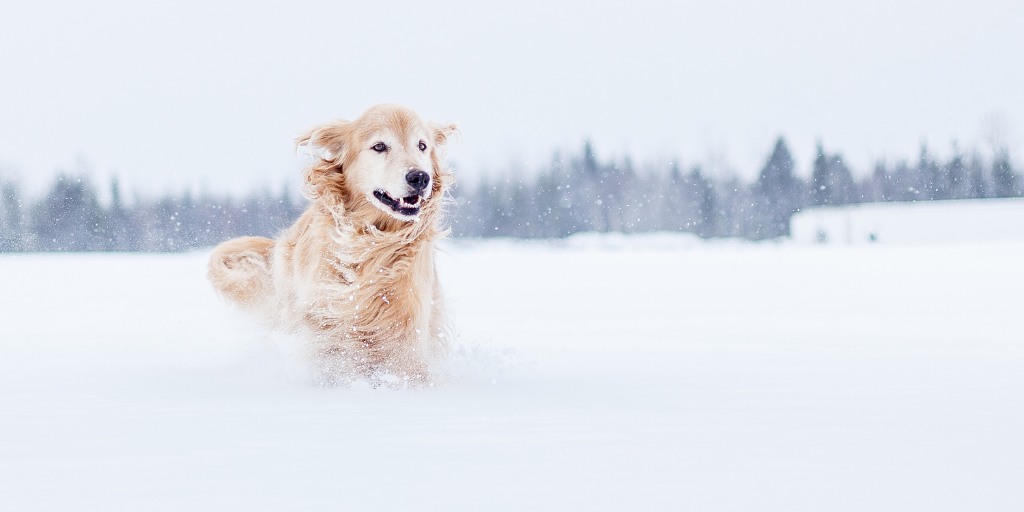1. It's New And Different
Snow changes your dog's surroundings, making it novel, different and exciting. Thus becoming a form of enrichment for dogs. When we provide our dogs with enrichment, we do so to bring variety to their world, a change from everyday life. Snow literally alters the landscape and what your dog sees, smells, hears and feels. This provides mental stimulation. Further supporting the theory that the novelty of snow is a factor in your dog's excitement for is that many cold weather and winter breeds who are regularly around snow don't always show the same excitement for it.2. Sensory Changes
As aforementioned, snow alters everything for your dog - including sensory changes, such as scent and feel. Snow can provide new smells and change familiar ones in the air and on the ground. Colder environments tend to mask odors better than warmer ones, making scent less available and more difficult for dogs to detect. And because scent is such an important part of our dog's lives, it makes sense why this would lead to intrigue and excitement. In addition, snow provides new tactile experiences for your dog. Simply the feel of snow on the body and paws is novel and enough to excite them. In addition, dogs run warm and so the sensation of cold is enjoyable.3. Exploratory Instincts
Dogs are, by nature, exploratory creatures and snow can not only ignite those instincts, but also enhance the exploration experience. Because snow changes the appearance and scents of the surroundings, it provides an exciting opportunity to explore that can renew their interest in a familiar environment.4. A Big Playground
One more straightforward reason why some pups love snow is because it's fun. Dogs love to play and snow can transform your dog's world into a big playground. Where once there was grass or dirt and not much to do but sniff, now there's a blanket of white fluff that your dog can romp around in. It's like a new toy. This isn't just the case for dogs - other animals with play instincts, such as bears and river otters, also enjoy snow.5. Social Aspect And Conditioning
Dogs are social creatures and their love for snow can be as simples as that: it's time with their pack. Dogs are very motivated in social settings, so they may just love the snow because they know it means quality time - from running through or jumping around in it to chasing snowballs and building snowmen together. Moreover, some dogs love snow because we teach them to. Our encouragement and reinforcement around snow creates a positive association and conditions them to enjoy it.6. Predatory Instincts
Even though they are now domesticated, dogs predatory animals thanks to their wolf ancestry. Predators tend to like change in their environment, such as snow, while prey do not (because they want to predict where dangers are coming from and have an escape plan). So because dogs are predatory animals, snow can trigger your dog's instincts to sniff, track and hunt. Furthermore, snow and cold alter the appearance and scent of prey signs, which is intriguing for dogs. For example, urine not only smells different but also looks different (yellow on the white snow).7. They Can Tolerate Cold Better Than Us
Some dogs like snow better than humans and for good reason. This is because they have physical and biological systems in place to better protect them from the cold. Their fur, of course, helps adequately protect many dogs from the elements, especially for fluffy dogs (note: some will still need extra protection, like pet coats and jackets). Dogs can also turn up their metabolism in cooler temperatures to keep them more comfortable. In addition, research has shown that dogs have special venous anatomy in their paws that keeps them warm. Specifically, the arteries supply warm blood to a network of small veins in the paws that transfer heat to the pads.All that being said, how much your dog tolerates the winter weather and snow depends on the individual dog as well as their breed, so always monitor and make sure your dog is still comfortable. Some temperatures are too cold for any dog, as elaborated upon here.
Not All Dogs Like Snow
While many dogs like snow, others do not. Here are some examples of dogs that may not like snow and why:
- Small dogs and toy breeds (get cold more easily than others)
- Dogs with short fur or hairless breeds, such as Greyhounds and Basenjis (get cold more easily than others)
- Dogs with short legs, such as Basset Hounds and Dachshunds (bellies can brush against or be submerged in snow)
- Dogs with long hair (fur can become matted with ice and snow, especially between their toes)
- Dogs with arthritis (snow and cold wether tends to exacerbate joint stiffness and pain)
In these cases, you'll want to take the proper precautions. For example, use winter clothing for dogs with short coats and trim the fur around the toes and nails of long-haired dogs. Make sure to monitor your dog, even those who enjoy the snow. Watch for signs of discomfort such as shivering, lifting or holding paws off the ground, ice clumps on the toes and more. Also, try to avoid letting your dog eat too much snow. Keeping our dogs safe is the top priority!

